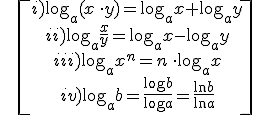Powers, roots and logarithms
Logarithms
The logarithm of a number is the exponent to which another fixed value, the base, has to be raised to produce that number.
The logarithm of b to base a, if a>0 and a≠1, is:
![]()
Examples:

Properties:

Example: If log 5 ≈ 0.7, then calculate log 50, log510, log 2 and log 125
 ç
ç
Exercises:
1.- Calculate:
a) log 0.01=
b) log35√812=
c) log7(5√49/4√343)=
2.- If ln 5 ≈1.6, calculate:
a) ln 5e =
b) ln √(e/25)=
c) ln4√125=
Solutions: 1.- a) -2; b) 4/5; c) -7/20; 2.- a) 2.6; b) -1.1; c) 1.2
Licensed under the Creative Commons Attribution Non-commercial Share Alike 3.0 License